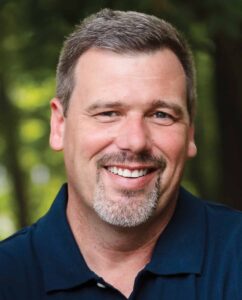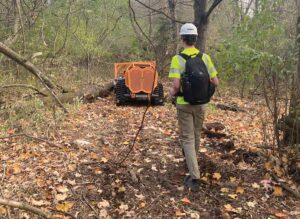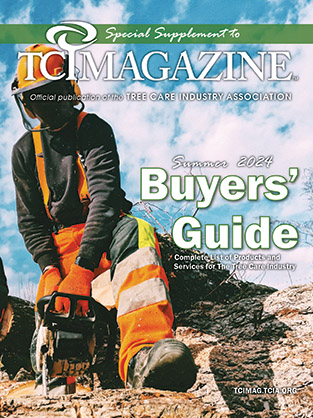Accreditation Guides Growth for New Life Arboricultural Services
Tim Scherpenisse, owner of New Life Arboricultural Services based in Grand Rapids, Michigan, is adamant about maintaining a slow and steady rate of growth within his company. “We’re always growing and looking for the next legacy client, but if the opportunity does not align with our core values, we pass,” he notes, adding, “For us, it’s all about controlled growth.”

New Life Agricultural Services has invested in a range of specialized equipment for undertaking ROW and roadway work.
Though it didn’t start that way, New Life, a TCIA member since 2021, is primarily involved in municipal right-of-way (ROW) and Department of Transportation (DOT) highway work, serving the entire state of Michigan, according to Scherpenisse. As a high schooler, he owned his own landscaping company, but he says, “I realized there had to be more than cutting grass. As a visionary, I knew I wanted more.”
That led to eventually becoming an arborist and quickly rising up through the ranks of a large tree-service company, ultimately becoming a production manager. “But not being an owner was not my happy place,” Scherpenisse notes.
Finding his “happy place”
In 2006, Scherpenisse started New Life Arboricultural Services. “My biggest fear was not the idea of failing, it was being good at something that was not worth doing,” he says. “I wanted my business to reflect my core values and give something back to the community.”
He says he was all alone when he started his company, specializing in residential work first “because it was low-hanging fruit.” Eventually he brought on a couple of family members and friends, and the business quickly started to gain traction. “We truly are a family company,” he says, “and I love that.” Scherpenisse says his son, Luke, is now 18 and works full time for New Life.
“He started doing more for us during COVID, and he loves the work,” Scherpenisse says of Luke. “He’s a little ‘mini me’ when it comes to strategy and vision.”
As his business gained steam, Scherpenisse began to take on ROW and DOT roadway work. “The bulk of our work currently is municipality. Once you go down that (ROW and DOT) road, you have to be committed. It takes specialized equipment – for ROW work, we have a Sennebogen whole-tree harvester and the Green Climber remote-
controlled forestry mower, among other things.”

Tim Scherpenisse
New Life currently has anywhere from 15 to 18 full-time employees, including office manager Lisa Segard, who Scherpenisse says is “the integrator to my visionary,” referring to the Entrepreneurial Operating System (EOS) process. “In order to wear fewer hats of responsible tasks and to hire people better than myself, we also hired Eric Dufort as director of company advancement,” he notes. “Eric works on the big picture and long-term thinking, and he sets the company up for future alliances for far bigger opportunities in the coming years.”
Also on the leadership team is Rebecca Kosta, who manages client expectations and billing and is tasked with all the permitting that goes along with DOT, ROW and municipality vegetation management. “Beyond their jobs, both are fundamental contributors to the leadership team,” Scherpenisse adds.
When it comes to general hiring, he notes, “We like to bring on and focus on those who need an opportunity, not necessarily just those who want a job.”
One of his company’s more unique opportunities, says Scherpenisse, is what he calls the Weekend Warrior Program. He trains people who have (or had) other careers but love tree work and only want to work Saturdays or maybe the occasional weekday. For instance, one of his Weekend Warriors is a former detective. “The work is there, it’s just a matter of having the crew, so this kills two birds with one stone. And it takes the burden of long hours and overtime off our regular employees.
“Each person is fully trained to our regular standards in whatever task they’re doing,” he adds, “whether that’s dragging brush and operating the chipper or using a chain saw. These are not the glamour jobs, but it’s an extra paycheck, and let’s face it, tree work is really fun if you don’t have to do it every day.”

Luke Scherpenisse works with the company’s Green Climber remote-controlled forestry mower.
Core values
Another thing that sets his company apart is the practice to “Do the most good,” which fits in with its core values of “Community” and “Care of neighbors.” Scherpenisse says that could be something like doing a simple, small removal off the books for a neighbor in need or a local nonprofit. “Our goal is 10% giveback every year,” he notes.
Part of that giveback includes giving to his employees. Every day, Scherpenisse provides a table set up with breakfast items and lunch makings, plus drinks and snacks for crew members to take with them to the job site. In the summer, Scherpenisse grills an occasional after-work dinner, and in the winter he hosts what he calls “Warm-Up Wednesdays,” when he makes a slow-cooker meal for his people. “Families are always invited,” he says. “It reinforces my belief that safety is a policy, but really it’s a culture. Us eating together and seeing each other’s spouses and kids enforces that. It’s hard to eat with each other and then not want to look out for each other.”
Accreditation and growth
“I think the biggest personal reason in wanting to have an accredited company was having a process for safety from top to bottom, at every level, especially as we became a larger company,” explains Scherpenisse. “It was all part of our controlled growth after spending years building a foundation.”
New Life’s safety director, Amy Nowack, coordinated the Accreditation process, which took a year and was completed in March of 2024. Scherpenisse adds that they were very thorough. “If it took two steps normally for Accreditation, we took 10 steps. We also wanted our whole team to be involved and to share our vision. We brought them in to make sure they had input and insight, and for them to see that we care enough about the culture and safety to get their feedback. It was a way to empower our employees.”
Scherpenisse admits the Accreditation process was a bit daunting, but well worth it. “We already had a safety program and versions of an employee handbook and a business plan that were outdated and needed to be rewritten,” he says.

New Life provides a table set up with breakfast items and lunch makings, plus drinks and snacks for crew members to take with them to the job site.
“We needed to rewrite the employee handbook ourselves (not use a templated version) in order to really own it, to put some sweat equity into it. Then we had to really redo our business plan. We realized we’d been doing well but hadn’t focused on, ‘How can we do better?’ We learned we have a long way to go to be the company we want to continue to be. We want to strive to be what an accredited company should be. We didn’t go through all this for a plaque on the wall or a decal slapped on our trucks,” he says. “We’re doing it to benefit the company.”
Scherpenisse concludes with his personal reflections on what he learned during the Accreditation process. “As an owner, I validated my understanding that I needed to accept that it’s OK to ‘not touch the trees daily,’ but that my role is to shepherd the team and lead in a way that creates a culture of individual growth resulting in company growth. To work on the business, not in the business.
“I think it’s hard for ‘tree people’ to understand that their role now is not to cut, but to build. Through the Accreditation process, I learned and validated my thoughts on my new role and responsibility as an owner and a leader.
“A lot of people depend on our company to be the best it can be,” he notes. “We are not a little company anymore, and I owe it to every current and future employee to make it the best it can be, even when that means letting go of responsibilities and allowing others more capable than I to lead my company.”
Patricia Chaudoin has been a freelance writer/editor for more than four decades, in areas as disparate as tree care, golf, weddings, luxury travel and international non-profit NGOs. She has been writing for TCI Magazine since 2016.




